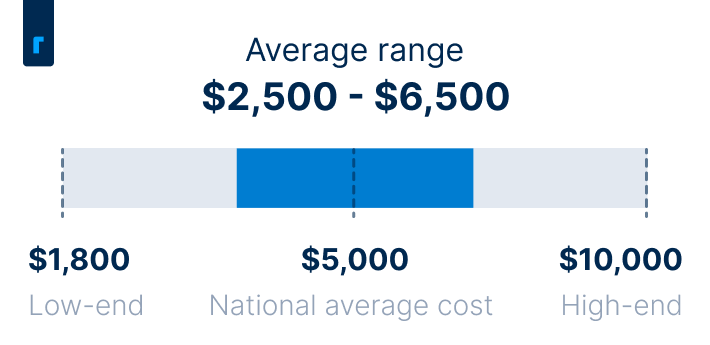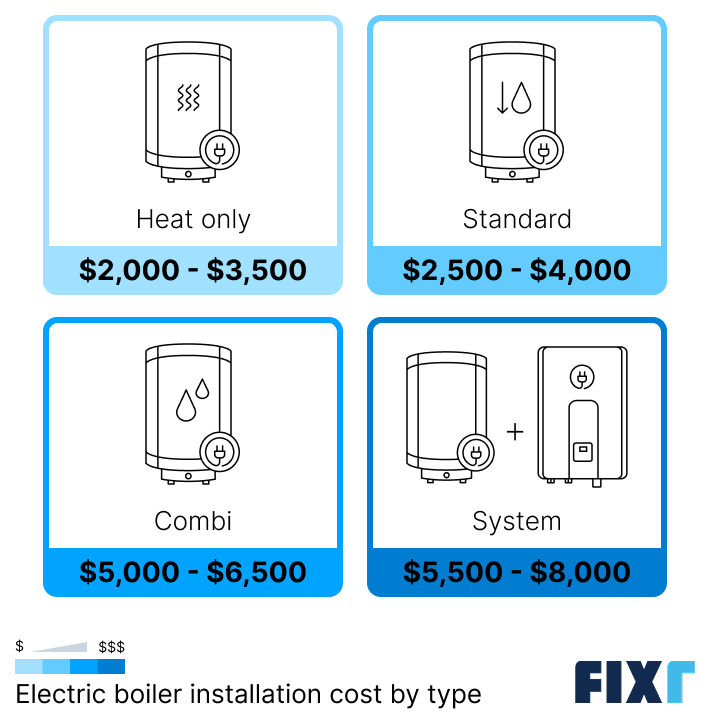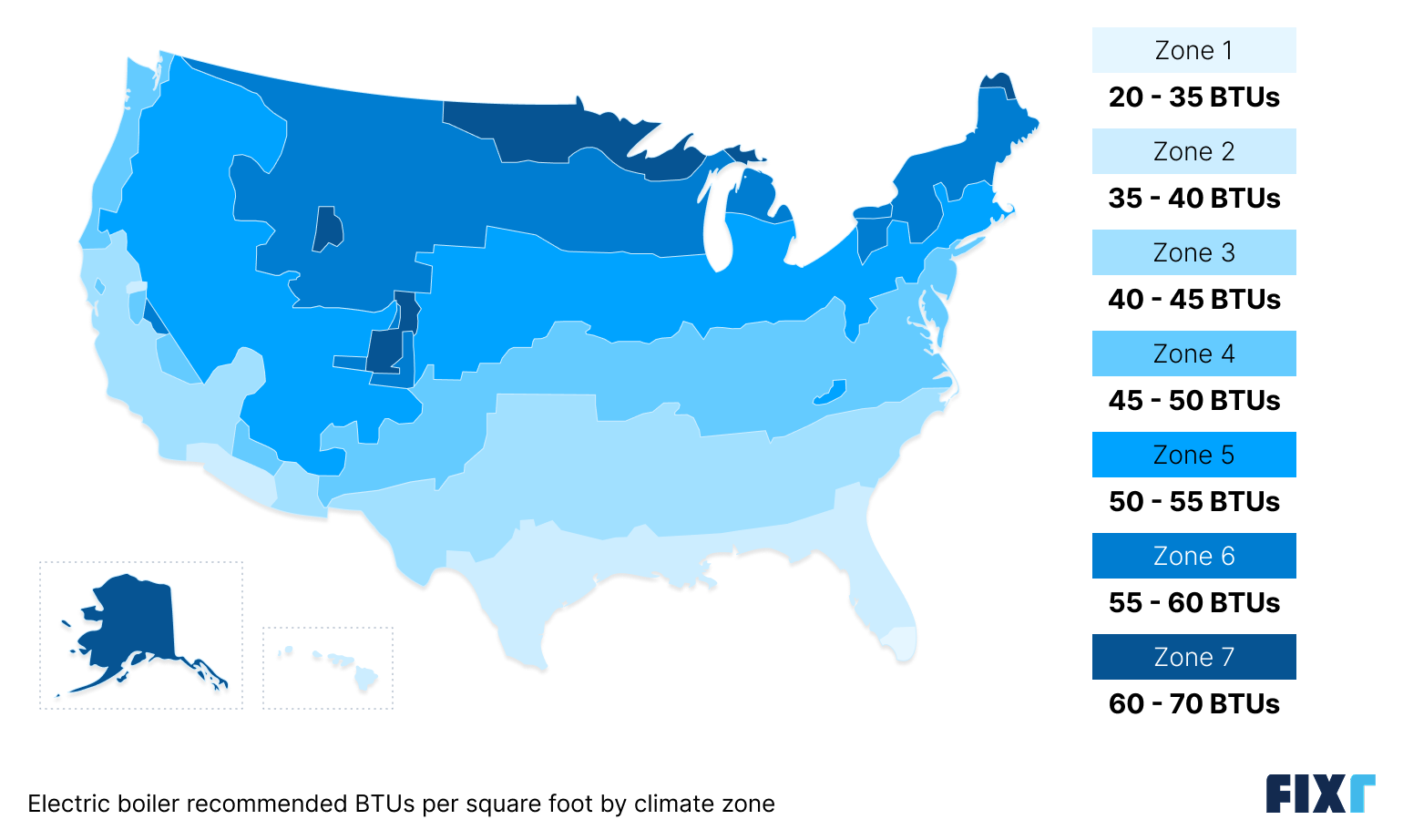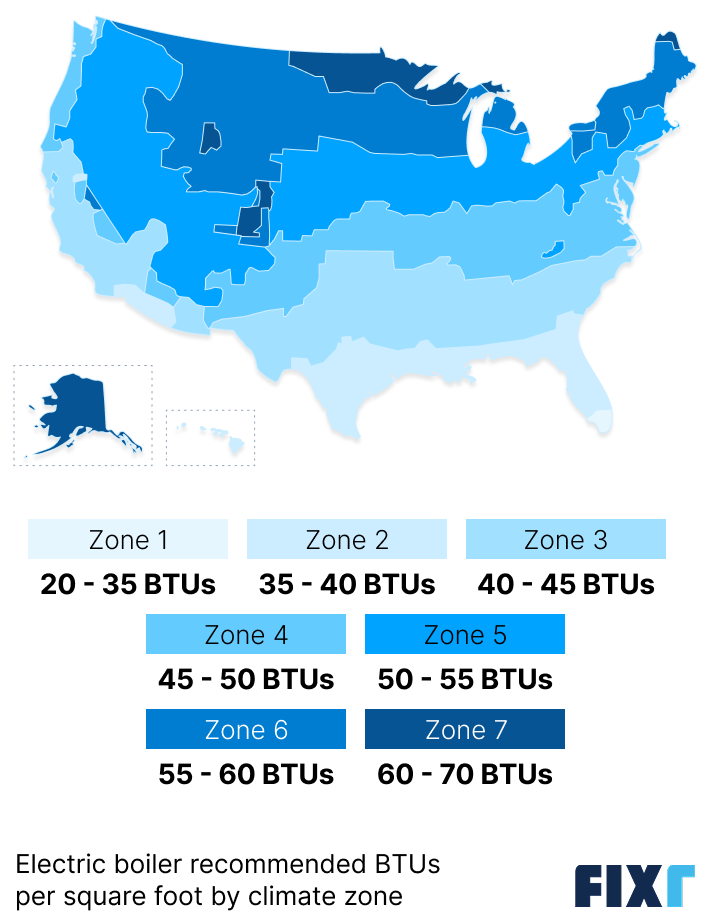Updated: January 26, 2026
Written by Dan Simms
Laura Madrigal is the Home Design Specialist at Fixr.com, dedicated to identifying and analyzing significant changes within residential design. She is the author of leading trends reports on interior design, kitchen, and bathroom, and her insights have been featured in publications like Realtor and the New York Post.
Learn moreReviewed by Laura Madrigal
The national average cost to install an electric boiler is $5,000, and most homeowners pay somewhere between $2,500 and $6,500. Your costs will depend on the type and size of the boiler you need, which are determined by your home size, the climate in your area, and your home’s demand for heat and hot water.
Electric boilers are increasingly popular alternatives to boilers that burn fossil fuels to generate heat. They’re significantly more eco-friendly, especially if you pair them with solar, they’re safer because they don’t generate dangerous gases, like carbon monoxide, and they offer the highest level of energy efficiency possible from a boiler, impacting your overall energy use.
Electric Boiler Cost


Electric Boiler Cost by Type
There are four main types of electric boilers to choose from, and they can vary in cost as well as functionality.


Type of Electric Boiler | Average Cost |
Heat-only | $2,000 – $3,500 |
Standard | $2,500 – $4,000 |
Combination (combi) | $5,000 – $6,500 |
System | $5,500 – $8,000 |
Heat-Only
A heat-only electric boiler is the most affordable type, costing between $2,000 and $3,500 for an average-sized home. These electric boilers only heat water for space heating, so they can be significantly less powerful than a boiler that heats water for space heating and domestic hot water. You’ll need to couple these with standalone water heaters.
Standard
A standard electric boiler provides hot water both for space heating and your plumbing fixtures. They store hot water in a small, internal cylinder, so it’s possible to run out of hot water. As such, these are best for smaller homes or those where the demand for hot water is low. Standard electric boilers cost between $2,500 and $4,000 for the average-size home.
Combination
Combination electric boilers or “combi” boilers provide hot water on demand for both home heating and domestic use. You’re less likely to run out of hot water, but it’s still possible if your unit isn’t sized properly. Combi boilers need to be more powerful to meet the higher demands, so they’re more expensive. Electric combi boilers cost between $5,000 and $6,500, in most cases.
System Boiler
The term “system boiler” can refer to a few different setups with electric boilers. Generally, the term means you have an electric boiler for space heating and a water heater for domestic hot water. That could include a heat-only electric boiler or a standard electric boiler with either a tank-style or an on-demand water heater. This is the most common setup in modern homes, and it’s the most convenient. However, the system costs between $5,500 and $8,000. System boilers are the most common option for modern homes.
Electric Boiler Installation Cost by Size
One of the most important factors to consider when installing a boiler is choosing the right size to match your home and hot water demands. Electric boiler size is measured in watts or kilowatts (kW), as well as in British thermal units (BTUs), letting you compare directly with gas, propane, or oil for boilers.
Proper sizing is crucial, going too large can cause rapid cycling and reduce the boiler’s lifespan, while going too small may leave you short on heat or hot water. Generally, homes need between 30 and 60 BTUs per square foot, depending on the climate zone. Use the table below as a rough guide, but always have a professional size your system.
Home Size (Square Feet) | Recommended BTUs | Cost |
1,000 | 40,000 | $2,500 – $5,000 |
1,500 | 60,000 | $3,000 – $6,500 |
2,000 | 80,000 | $4,000 – $8,000 |
2,500 | 100,000 | $5,000 – $9,000 |
3,000 | 120,000 | $6,000 – $10,000+ |
What Size Electric Boiler Do I Need?
As mentioned above, most homes require between 30 and 60 BTUs per square foot, depending on climate, which gives a rough idea of the kW output your electric boiler might require. Keep in mind that factors like ceiling height, insulation, windows, sunlight exposure, and home age also affect heating needs. Choosing the right size is essential for efficiency, comfort, and keeping energy costs under control, making the unit more cost-effective in the long run.
Electric boilers are less powerful than fossil-fuel units, so they work best as a primary heat source in warmer climates. In cooler areas, they’re usually used alongside a gas, propane, or oil boiler. The numbers below are only a ballpark estimate, so a professional should confirm the right size for your home.


Climate Zone | BTUs per Square Foot | Example (2,000 Sq. Ft. Home) |
Zone 1 | 20 – 35 | 40,000 – 70,000 |
Zone 2 | 35 – 40 | 70,000 – 80,000 |
Zone 3 | 40 – 45 | 80,000 – 90,000 |
Zone 4 | 45 – 50 | 90,000 – 100,000 |
Zone 5 | 50 – 55 | 100,000 – 110,000 |
Zone 6 | 55 – 60 | 110,000 – 120,000 |
Zone 7 | 60 – 70 | 120,000 – 140,000 |
Labor Cost to Install an Electric Boiler
Labor for installing an electric boiler is handled by HVAC contractors, who typically charge $75 to $150 per hour depending on experience and location. This work includes disconnecting and removing your old boiler, installing the new unit, and connecting it properly to your home’s electrical and plumbing systems.
Your labor costs can vary widely, depending on a few factors. The local cost of living will largely determine your base costs, but you could also pay more if you need to relocate your boiler, if you’re converting from a different fuel source to electric, or if you need electrical add-ons, like upgrading to 200-amp service or installing a subpanel to handle the higher loads.
Electric Boiler Cost per Month
Electric boilers can be expensive to run due to high electricity costs, although it depends on local pricing. To estimate your monthly costs, take your boiler’s kW rating, multiply it by the hours it runs per day, and then by your local electricity rate. According to the Energy Information Administration (EIA), the average cost per kWh (kilowatt-hour) as of July 2025 is 17.47 cents.
For example, in a hot climate, a 54,000-BTU boiler that’s suitable for an average-size home is around 16 kW. Boiler run time varies with factors like temperature and insulation, but 1 to 3 hours per day is typical in warm climates. That means your boiler will consume between 16 and 48 kWh per day, which would cost between $2.80 and $8.39 per day, or $84 to $251.70 per month.
Always speak with a professional HVAC technician to see if an electric boiler is a good option for your home. They can estimate your running costs based on demand, home size, climate, and more.
Pros and Cons
Electric boilers have both advantages and disadvantages, and it’s important to understand these before you decide if this is the right type of heating system for you.
Pros
- + Easy installation: You just need a high-voltage outlet, so there’s no need for gas lines, chimneys, large storage tanks, or venting systems. This makes setup faster and less expensive.
- + High safety: Electric boilers don’t use a combustion process or stored fuels, so there’s no risk of carbon monoxide poisoning, potentially deadly gas leaks, or environmental contamination from oil tank leaks.
- + High efficiency: Electric boilers are the most efficient options, with nearly 100% of the electricity getting converted into heat.
- + Environmentally friendly: No reliance on fossil fuels means fewer emissions, and your carbon footprint could be non-existent if you pair your boiler with a solar array.
- + Compact size: Electric boilers have a smaller footprint than other options and don’t require fuel tanks, so they’re ideal for apartments, condos, or small homes with limited space.
- + Low maintenance: Fewer moving parts and no burners or fuel lines to service mean you have less maintenance.
Cons
- - Higher running costs: Electricity is usually more expensive than natural gas, leading to higher monthly bills.
- - Limited heating capacity: Electric boilers may not provide sufficient heat for larger homes or very cold climates.
- - Power outages: An electric boiler won’t operate during outages unless you have a backup power source, like a generator or solar battery.
- - Possible electrical upgrades: Older homes may require upgraded electrical panels or subpanel installations to handle the increased load on the system, adding to costs.
- - Fewer incentives: Rebates and tax credits often prioritize high-efficiency gas heating systems or more common electrical heating systems that use heat pump technology.
Replacement vs. Repair
Deciding whether to repair or replace your electric boiler often comes down to its age, overall condition, and the cost of the repair. If your boiler is less than 10 years old and the issue is minor, such as a faulty heating element or thermostat, repairing it is likely the more economical option. Boiler repair costs an average of $450, while a complete replacement will average $5,000.
However, if your boiler is more than 10 to 15 years old, a replacement is usually the better long-term solution and can end up saving you money. Older boilers are more prone to frequent and expensive breakdowns, and their efficiency may have declined over time, leading to higher utility bills. While a replacement has a higher initial cost, a new, more efficient model can save you money on your energy bills and comes with a new manufacturer's warranty for peace of mind.
Additional Costs
While the boiler size and type are the two most significant cost factors, there are other things you should think about to avoid surprise charges on your final bill.
Permits and inspections: Most municipalities will require permits for boiler installation or replacement, typically costing between $200 and $500 in most cases. However, these could climb higher if you need more extensive electrical work first.
Boiler brand: The brand of boiler you choose will have an impact on your upfront costs and can play a role in system longevity. High-end brands like Ambient and Viessmann are likely going to cost more than more budget-friendly options, like Argo.
Maintenance: It’s a good idea to take ongoing maintenance costs into account when budgeting for new electric boiler costs. Electric boilers require less maintenance than gas boilers and can save you money in that regard. Expect to pay between $200 and $500 for a routine inspection and maintenance service.
Electric boiler with solar panels: Solar panel installation costs an average of $23,100 before incentives, or $16,170 after the federal tax credit. While this is a significant add-on, it could eliminate your electric boiler running costs and pay for itself over time via savings on your utility bills in general.
Additional features: Smart options like Wi-Fi, vacation mode, or remote control improve energy efficiency and convenience. While they raise the upfront price, these features can help reduce running costs and make managing your heating easier.
Warranty: Most boilers include a 10-year warranty, so use that average to compare and find a good balance between upfront cost and peace of mind after installation. Generally speaking, boilers with longer warranties last longer and provide better value.
DIY vs. Hiring a Professional
Installing an electric boiler yourself is not a recommended DIY project. While you could save on labor costs, the project involves complex electrical and plumbing work that poses significant safety risks. Even minor mistakes can lead to electrical fires, water damage, and issues with mold and pest infestation. Plus, most manufacturers will void your warranty if you don’t have a licensed professional handle the installation.
Hiring a professional is usually necessary anyway, as most municipalities will only issue permits if you have a licensed contractor fill out the paperwork and provide certificates of occupancy (COs) if a pro signs off on the installation. Even if your city allows DIY installations, hiring an expert means a safer installation and ensures your boiler is sized appropriately for your home and climate.
Ways to Save on Electric Boiler Installation
Electric boiler installation is expensive, but there are a few ways you can bring down upfront costs and help keep your operating costs down for long-term savings.
Choose a standard model: Combination boilers are more expensive upfront, so opting for a standard model can help lower your initial costs. Just keep in mind that you may need a separate water heater, depending on your family’s demands.
Get multiple quotes: Always get at least three estimates from local professionals. You can then compare bids to rule out unusually high or low prices and to find the best value possible.
Improve insulation first: Upgrading insulation, sealing air leaks, and refreshing weatherstripping on windows and doors can make your home more energy-efficient and reduce heating demand.
Look for rebates and incentives: Your state or local utility company may offer rebates, tax credits, or other incentives for installing a new, energy-efficient electric boiler. You can check the Database of State Incentives for Renewables and Efficiency (DSIRE) for more information. Look for an ENERGY STAR-certified model to ensure the best chance of qualifying for those perks.
Opt for an off-season installation: HVAC companies are often less busy in the late spring and early fall. If possible, schedule your boiler replacement cost project for these times, as some companies will charge less for labor due to the decreased demand.
Electric Boiler vs. Gas Boiler
Gas boilers are the most prevalent type in the U.S., with electric heating systems close behind, so many homeowners in need of a new boiler will likely be considering which is the better option. Ultimately, it depends on your climate, the size of your home, and how many people live in your house.
Electric boilers are a safer and more affordable option that are suitable in warmer climates, while homeowners in extremely cold climates should stick with a boiler that burns fossil fuels to ensure they have ample heat. Electric boilers are more affordable upfront, require less maintenance, and are more eco-friendly and efficient, but they usually cost more to run. Speak with a professional HVAC company if you’re not sure which is the better option for your home.
Electric Boiler | Gas Boiler |
Lower output of heat | Higher output of heat |
Suitable for warm climates | Suitable for all climates |
Lower upfront cost; $2,500 – $6,500 | More expensive to install; $4,000 – $10,000 |
No venting required | Placement restrictions due to venting |
More eco-friendly | Produces emissions |
No dangerous gases | Generates carbon monoxide |
More costly to run | Usually the cheapest to run |
Less maintenance | More maintenance |
No heat during blackouts | May run during power outages |
Cost to Replace Gas Boiler With Electric
If you do decide that an electric boiler is best and you currently have a gas boiler, you’ll need to have your HVAC professional convert your system. This involves capping your old gas line, and most homeowners will also need to install a dedicated high-voltage outlet for the new boiler. Some may also need to install a subpanel to handle the boiler’s high electrical load.
In total, the conversion will add between $500 and $2,500 to your total, although prices could climb higher if you need major electrical changes, like upgrading to 200-amp service, which can bump up your costs by an additional $3,000, on average.
FAQs
Yes, electric boilers are often more expensive to run than gas boilers, as electricity is generally more costly than natural gas in the U.S. However, the exact operating cost depends on your local electricity rates and gas prices, the size of your boiler, and how many hours it runs each day. In some cases, electric boilers can be more affordable to operate, especially if you couple them with solar panels that generate free energy for your home.
The average cost range to install an electric boiler is between $2,500 and $6,500 for the boiler unit and professional installation. The total cost can vary based on the boiler type, size, and installation complexity, and it can climb much higher if you need major changes to your electrical system.
The cost to run an electric boiler per month depends on so many factors that it’s challenging to provide even an average estimate. The local cost of electricity in your area, the demand you place on your boiler, the boiler size and type, your local climate, and more all play important roles in operating costs. However, for an average 1,800-square-foot home in a warm climate with average electricity rates, monthly costs could range from around $80 to $250.
A major disadvantage of electric boilers is their higher running cost compared to gas boilers. They also have a lower heating capacity, which means they may not be sufficient for heating a larger home, and they’re usually not suitable as standalone heating systems in very cold climates. Additionally, they will not operate during a power outage unless you have a backup generator or solar battery.
Electric boilers are known for their durability and can last 15 to 20 years with proper maintenance. Their simple design with fewer moving parts means they often require less maintenance than gas or oil models.
No, electric boilers do not require a chimney, flue, or any exterior venting because they do not burn fuel or produce combustion gases like carbon monoxide. Unlike gas or oil systems that must exhaust toxic fumes, electric boilers are 100% efficient at the point of use, allowing them to be installed almost anywhere in a home, including closets or under stairs.
